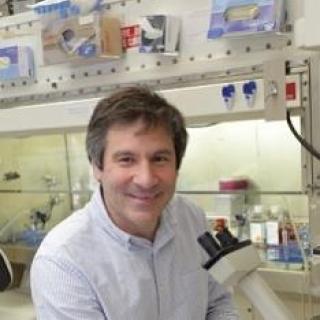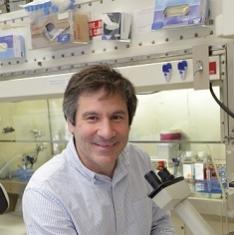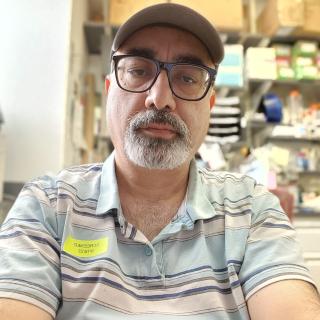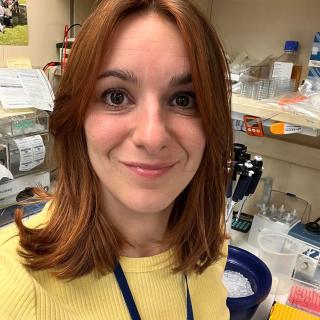
Paul A. Roche, Ph.D.
- Center for Cancer Research
- National Cancer Institute
- Building 10, Room 4B36
- Bethesda, MD 20892
- 240-858-3355
- paul.roche@nih.gov
RESEARCH SUMMARY
Dr. Roche uses molecular and cellular approaches to study to cell biology of lymphocyte activation by antigen presenting cells. More specifically, his work attempts to understand how dendritic cells, and other antigen presenting cells, generate and present peptide fragments of internalized foreign antigens to CD4 T cells. Antigen processing and presentation of MHC class II-peptide complexes to specific T cells is important for T cell development/selection as well as the ability of animals to mount immune responses to destroy foreign pathogens in the body.
Areas of Expertise

Paul A. Roche, Ph.D.
Research
Cell Biology of Antigen Processing and Presentation
Our lab studies the molecular events leading to the activation of CD4 T cells by antigen presenting cells (APCs) including dendritic cells (DCs) and B cells. We are interested in identifying the molecular machinery that regulates the trafficking of MHC class II molecules into lysosomal antigen processing compartments as well as the machinery used to deliver peptide-loaded MHC class II molecules (MHC-II) from these compartments to the plasma membrane. We are also interested in how MHC-II-peptide complexes are organized on the plasma membrane for efficient T cell activation by APCs. We have two groups within our laboratory, one studying the cell biology of antigen processing and presentation and another studying the basic mechanisms of protein trafficking in APCs and other hematopoietic cells.
MHC Class II Antigen Processing and Presentation. MHC-II binds foreign-antigen derived peptides in lysosome like antigen presenting compartments in APCs such as DCs and B cells. We are interested in understanding the molecular mechanisms required for MHC-II to gain access these compartments, load with peptides in these compartments, and then leave these compartments to the plasma membrane. Once on the plasma membrane, MHC-II-peptide complexes stimulate CD4 T cells, and we are also studying the association of MHC-II with plasma membrane microdomains to determine the extent to which association with these domains enhances T cell activation by APCs.
In addition to following the transport pathway used by newly synthesized MHC-II to access peptide loading compartments, we are following the fate of plasma membrane MHC-II-peptide complexes on APCs. We find that these complexes readily internalize into APCs and access multivesicular peptide loading compartments. Curiously, these internalized complexes are readily secreted from APCs on small vesicles termed exosomes. We are interested in identifying the machinery used by MHC-II to sort into peptide-loading compartments and onto exosomes to help unravel the mystery of exosome function in the immune system.
Regulation of Intracellular Protein Transport. The orderly transport of proteins within the secretory pathway of eukaryotic cells is mediated by the recognition of donor membrane-derived vesicles with distinct target organelles. The specificity of this interaction is thought to be mediated in part by the specific interaction of membrane proteins termed SNAREs. There are SNARE proteins present on donor membranes and on target membranes and it is thought that the formation of the trans-membrane SNARE complex is important for the eventual fusion of the opposing membranes. Our laboratory has discovered a ubiquitously expressed SNARE, termed SNAP-23, that is plasma membrane-associated and can be thought of as a 'receptor' for SNAREs present on secretory granules/transport vesicles. Using a variety of SNARE knock-out and transgenic mice we are examining the role of SNAP-23 and other SNARE proteins in both constitutive and regulated membrane traffic in APCs, T cells, and mast cells.
Publications
- Bibliography Link
- View Dr. Roche's PubMed Summary.
The ins and outs of MHC class II-mediated antigen processing and presentation
Suppression of antigen presentation by IL-10
TLR signals induce phagosomal MHC-I delivery from the endosomal recycling compartment to allow cross-presentation
The ins and outs of MHC class II-mediated antigen processing and presentation
Ubiquitination by March-I prevents MHC class II recycling and promotes MHC class II turnover in antigen-presenting cells
Biography

Paul A. Roche, Ph.D.
Dr. Roche received his Ph.D. from Duke University Medical Center. He obtained postdoctoral training in the laboratories of Peter Cresswell at Duke University and Eric Long at the National Institute of Allergy and Infectious Diseases prior to joining the Experimental Immunology Branch.
Job Vacancies
We have no open positions in our group at this time, please check back later.
To see all available positions at CCR, take a look at our Careers page. You can also subscribe to receive CCR's latest job and training opportunities in your inbox.
Team
News
Learn more about CCR research advances, new discoveries and more
on our news section.


